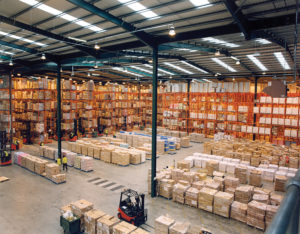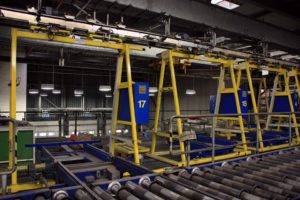 Metal service centers have experienced some significant changes in the past few years. They’re incorporating more services, expanding their responsibilities, and effectively shifting from distribution to manufacturing, as noted in an eBook we published on this subject.
Metal service centers have experienced some significant changes in the past few years. They’re incorporating more services, expanding their responsibilities, and effectively shifting from distribution to manufacturing, as noted in an eBook we published on this subject.
Customers demand more from metal services centers, and if they want to rise and meet the challenge, they need software that can support them in their endeavors. For many, manufacturing execution systems (MES) are the answer.
What is an MES?
Amanufacturing execution system is a software system designed to provide a complete solution for manufacturers, one that incorporates various elements, such as monitoring resources, organizing manufacturing, and tracking the order process from the raw materials through to the finished product.
What are the Benefits of Using an MES for Metal Service Centers?
Manufacturing execution systems benefit companies of all sizes and across many industries, but they are particularly important in the metal fabrication sector, where they provide an overview of the manufacturing process and offer a variety of benefits.
Improved Efficiency
MES greatly streamlines the production process and provides visibility throughout every step. Fabricators can analyze the entire production cycle and intervene if necessary.
If there are any issues during the production process, the MES will highlight them, and fabricators can intervene, making informed decisions to remedy issues and improve efficiency.
Smaller Fabricators Can Compete
The automation tools and processes built into MES allow smaller manufacturers to punch above their weight and, potentially, compete with much bigger companies. They can divert vital resources to more important and pressing tasks while providing customers with faster production and enhanced customization.
It Records Various Key Performance Indicators (KPIs)
MES track various KPIs to provide a complete but simplified view of the production process. Fabricators can monitor the production cycle and highlight areas that need to be improved, while also locating poor-performing machines and processes and finding ways to optimize.
It crunches a lot of data and presents it in a visually appealing way, making it easier for fabricators to find simple improvements.
It Makes Customization Easier
As more customization is offered by fabricators and demanded by customers, it places a greater strain on the production process and exposes it to potential issues like delays and missing/lost materials.
MES keeps track of everything and provides a single source of control. It can be used to schedule every production phase, making sure each job has the materials needed and can be completed to the exact specification required within the timeframe needed.
It’s next-level organization in an industry that can devolve into disorganization very quickly, especially for companies taking on an increasing workload and trying to compete with bigger operations.
It Reduces Cost
By offering visibility on production, an MES will tell metal fabrication companies how much raw materials they are using. It can then direct the fabricator to more cost-effective alternatives, thus reducing waste while clarifying total cost and margins.
The metal fabrication sector is notorious for operating on very slim profit margins. It doesn’t take much for those margins to flip and the production cycle to enter the red. By analyzing costs in this manner, fabricators can adjust expenses on the fly, increasing their margin in the process.
It Paints a Complete Picture of the Shop Floor
Tracking tools, in combination with a simplified dashboard layout, give fabricators a complete overview of the entire production cycle, including the state of current projects, inventory, maintenance, scheduled jobs, and more.
Issues are flagged immediately and can be resolved quickly and with minimal interruption; bottlenecks can be identified and remedied by adjusting fabrication processes and altering the schedule; and if there is an issue to address, the system will help fabricators to direct resources to the right place before fixing the root cause of the problem.
It Helps with Quality Control
The quality control modules built into MES gather data from previous and current projects to identify patterns, spot defects, and highlight areas of concern. It provides a high degree of automation in a vital department that serves as the last line of defense, making sure the final product is ready to go.
If the datasets are large enough, they can even predict potential issues with the production process and flaws in the raw materials or final product.
It Reduces Downtime
MES integrates with devices that use the Industrial Internet of Things (IIoT). These devices connect to machines and record data that is then fed into the system. Using machine learning and advanced AI algorithms, and considering the current condition of a machine, MES can advise fabricators on which machines need to be maintained or replaced, thus avoiding costly downtimes and keeping operations at optimal levels.
IIoT devices will also look out for irregularities that could threaten the safety of employees or the integrity of the product.
Easy to Understand and Actionable
As you can see, MES is a data-driven software suite that accounts for various aspects across the machine floor. It’s complicated and multi-faceted, but at the same time, it presents all data in a way that is easy-to-understand. Fabricators can see real-time, actionable data presented in a clean and readable format, and as it presents a single source of information, it can be accessed and utilized across the company.
Summary: MES for Metal Service Centers
Manufacturing execution systems simplify complex and streamlined operations where increased demand and customization can weigh heavily. It’s an essential piece of the puzzle for metal fabrication companies and ensures simplicity through the many stages of production.
To learn more about how certain software solutions can benefit your metal service center, contact us today to request a demo. We can help you to implement a custom solution that combines multiple software integrations and applies across various departments, including inventory management, cut to length software, sheeting and leveling, coil splitting software, metal framing, and multi-line processing software.




